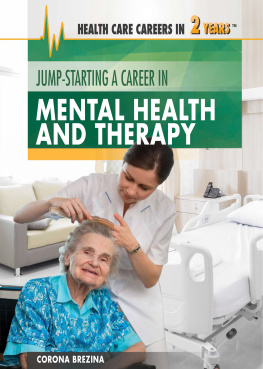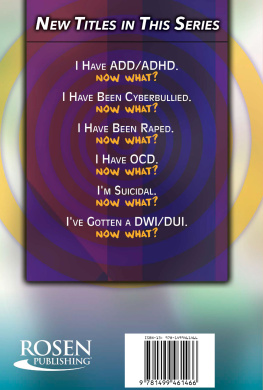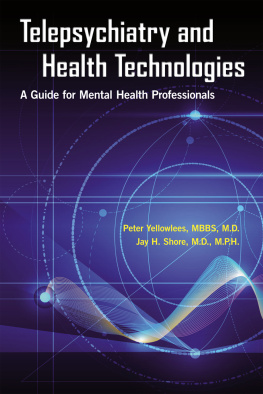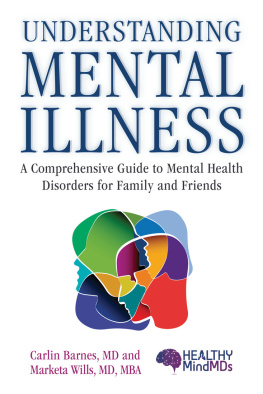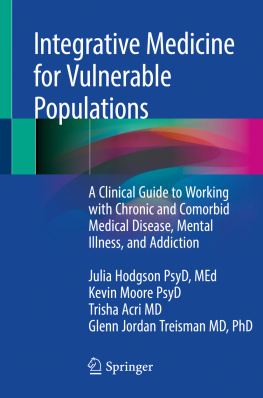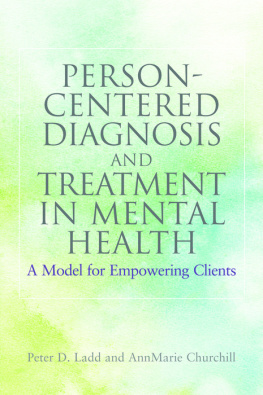- CHAPTER 1
WORKING IN THE FIELD OF MENTAL HEALTH - CHAPTER 2
RELATED HEALTH CARE OPPORTUNITIES - CHAPTER 3
GETTING A HEALTH CARE EDUCATION - CHAPTER 4
LANDING THE JOB - CHAPTER 5
MAPPING YOUR CAREER PATH
Published in 2019 by The Rosen Publishing Group, Inc.
29 East 21st Street, New York, NY 10010
Copyright 2019 by The Rosen Publishing Group, Inc.
First Edition
All rights reserved. No part of this book may be reproduced in any form without permission in writing from the publisher, except by a reviewer.
Library of Congress Cataloging-in-Publication Data
Names: Brezina, Corona, author.
Title: Jump-starting a career in mental health and therapy / Corona Brezina.
Description: First edition. | New York : Rosen YA, 2019. | Series: Health care careers in 2 years | Audience: Grades 7-12. | Includes bibliographical references and index.
Identifiers: LCCN 2018007105| ISBN 9781508184997 (library bound) | ISBN 9781508184980 (paperback)
Subjects: LCSH: Mental health personnelVocational guidanceJuvenile literature. | YouthTobacco useJuvenile literature.
Classification: LCC RC440.8 .B74 2019 | DDC 616.890092dc23 LC record available at https://lccn.loc.gov/2018007105
Manufactured in the United States of America
CHAPTER 1
WORKING IN THE FIELD OF MENTAL HEALTH
CHAPTER 2
RELATED HEALTH CARE OPPORTUNITIES
CHAPTER 3
GETTING A HEALTH CARE EDUCATION
CHAPTER 4
LANDING THE JOB
CHAPTER 5
MAPPING YOUR CAREER PATH
M orning on the pediatric ward of a psychiatric hospital begins early with a hot breakfast for patients. The patients on the pediatric ward are children ranging from five to seventeen years old. They have been admitted because of severe mental health issues. They may be suffering from psychosis and lose touch with reality. They may represent a threat to themselves or others. Some may have overdosed on drugs before being admitted.
The psychiatric technicians charged with providing direct care for the patients have already begun to prepare for the day's work. They've reviewed the patient records from the previous shift. They assist patients with one of their first activities in the morning: setting personal treatment goals for the day. After breakfast, the psychiatric technicians might take the patients to the gym for an exercise period. Other activities on the tightly structured schedule may include academic classes, recreational therapy, journaling sessions, time in the art room, and group therapy-psychiatric technicians sometimes lead the sessions. Unplanned activities could involve defusing a patient's tantrum or preventing a patient from trying to run away.
Throughout the day, psychiatric technicians frequently make note of patients' moods, monitor what the patients eat and whether they sleep well, take the patients to their activities for the day, and prepare the patients for appointments with the psychiatrist. Psychiatric technicians also admit patients, which involves taking a medical history and listening to the concerns of both parents and children. They inventory the patients' possessions, remove any contraband, and complete the necessary paperworka psychiatric technicians work involves maintaining and updating highly precise and detailed medical records.
As the day winds down, the patients have visiting hours with parents and other family members. They review their progress on their goals for the day and get ready for bed.
The therapeutic environment and medical treatment is effective in treating young patients in crisis. Within a matter of days, most patients will have stabilized enough to be sent home with an outpatient care plan.
Psychiatric technicians represent an example of a mental health care career that is essential for patient care and personally fulfilling yet requires two or fewer years of education and training. They may hold a postsecondary certificate or associates degree in psychiatric or mental health technology.
Mental health care, like many fields within health care, is experiencing expansion and job growth. For new entrants to the workforce, health care can offer secure jobs that don't necessarily require expensive four-year degrees. Entry-level workers with an associates degree or less can enter the field of mental health care as, for example, a psychiatric technician or substance abuse counselor. Mental health care is a challenging and rewarding field in which compassionate professionals provide patients with treatment that can help them recover from mental health crises and manage longterm mental illness.
WORKING IN THE FIELD OF MENTAL HEALTH
M ental health professionals treat medical problems related to patients' emotional, psychological, and social health. Mental health is a wide-ranging field, and cases of mental illness are much more common than most people realize. According to the National Alliance on Mental Illness, about one out of five adults in the United States struggles with mental illness in any given year. These disorders range from manageable mental health concerns, such as an anxiety disorder, to serious long-term conditions, such as the mental illness schizophrenia.
Mental illness is treated by a variety of professionals who specialize in different roles in the mental health care system. Psychiatrists and psychologists diagnose and treat serious mental illness. Psychiatrists are medical doctors who can prescribe medication, while psychologists generally are not allowed to write prescriptions. Both psychiatrists and psychologists treat patients with psychotherapy, in which they talk with patients to help them resolve their problems.
Counselors and therapists also treat mental health problems. The specific descriptions and requirements of job positions in counseling vary from one state to another. Counselors often focus on specific concerns, such as substance abuse or family treatment. Psychologists are sometimes categorized as counselors, but there are educational programs that specifically train licensed professional counselors as well.
Likewise, "therapist" is a broad term that can describe a variety of mental health professionalsfrom psychologists to marriage counselors to life coacheswho provide people with guidance for the problems in their lives.
These specialists are almost always highly trained and educated, possessing a bachelor's degree and often a master's, doctorate, or medical degree. However, they are supported by a wide range of personnel who help treat patients and coordinate their care.
Overview of the Field
Mental health conditions can be treated in many types of settings and involve a variety of different mental health professionals. When someone begins to realize that he or she may be suffering from a mental health issue, that person may first turn to self-help resources such as books or websitesto learn more about what's wrong. He or she might also seek out a support group or make an appointment with a mental health professional. Treatment providers include facilities such as private practices, community mental health centers, and substance abuse treatment centers. Unless a person is in crisis, any treatment will probably be outpatienthe or she will visit a therapist or other professional for treatment sessions rather than being hospitalized.
Next page
